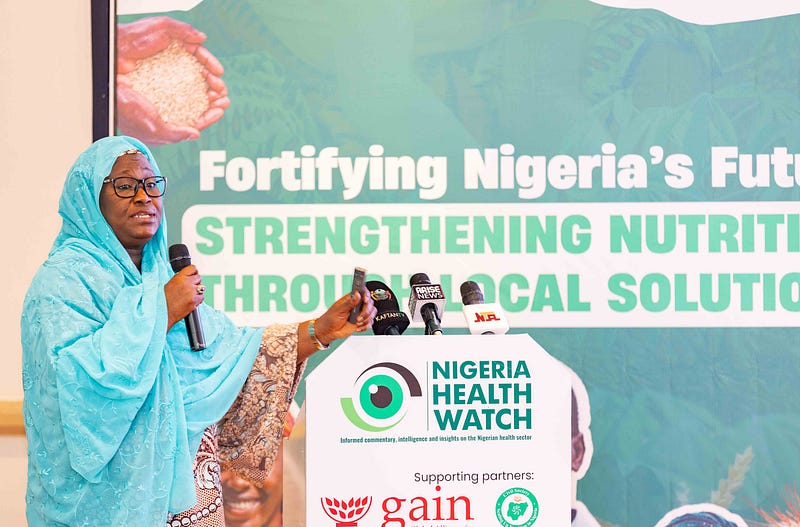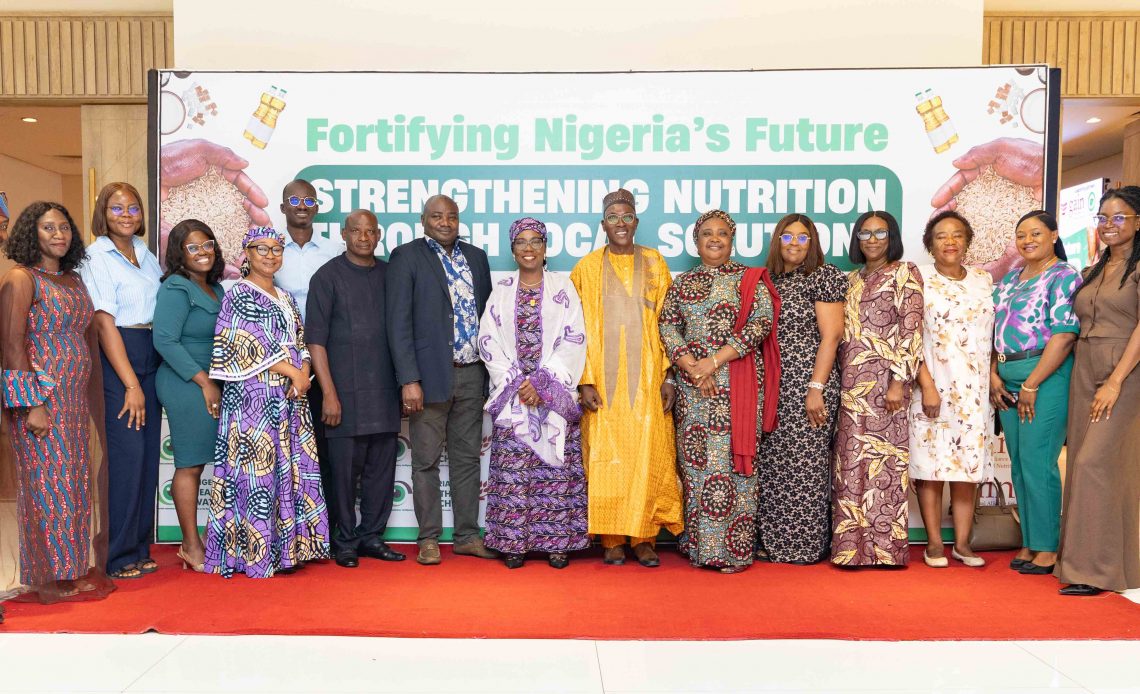Christopher Bassey and Favour Solomon-Uwakwe (Lead writers)
Nigeria’s malnutrition crisis has left approximately 32% of children under five stunted, highlighting an ongoing public health crisis and a need to strengthen food fortification.
At the recent Nigeria Health Watch Nutrition Roundtable, titled “Fortifying Nigeria’s Future: Strengthening Nutrition Through Local Solutions,” stakeholders addressed the urgent challenges of malnutrition in Nigeria. The discussions centred on food fortification efforts and explored practical strategies to improve standards by leveraging the potential of local production.
Safiya Shuaibu Isa, Deputy Director of Advocacy and Partnerships at Nigeria Health Watch, explained that malnutrition in Nigeria is not just about insufficient calories; it is about hidden hunger driven by micronutrient deficiencies.

Micronutrient deficiency is a silent killer and a major driver of long-term health challenges. It stunts growth, weakens immunity, and reduces cognitive capacity. Research links these micronutrient deficiencies to a wide range of physiological problems, including metabolic disorders, reduced immune, endocrine function, delayed physical development, and reduced cognitive performance.
“The heavy reliance on calorie-rich but nutrient-poor staples has left many children, women, and vulnerable communities at risk of hidden hunger,” Shuaibu Isa said.

Image credit: Nigeria Health Watch
The challenge of food fortification in Nigeria
Ummulkhaire Bobboi, Deputy Director for Food Safety and Applied Nutrition at the National Agency for Food and Drug Administration and Control (NAFDAC), emphasised that food fortification is vital for improving public health, as it helps address micronutrient deficiencies linked to anaemia, rickets, goitre, and neural tube defects.
In addition to health benefits, she emphasized that fortification improves children’s cognitive development and adult productivity, ultimately driving economic growth for families and the nation. The Federal Ministry of Health and Social Welfare (FMOHSW) also supports this view.
“A well-nourished population is more productive, innovative, and better positioned to drive national development, making food fortification not just a health intervention but also an economic and social investment,” said Ladidi Bako-Aiyegbusi, Director of the Department of Nutrition at the FMOHSW.

Image credit: Nigeria Health Watch
However, Nigeria’s progress has been hampered by inconsistent compliance with fortification standards, especially among Micro, Small, and Medium-Sized Enterprises (MSMEs), which constitute the majority of the country’s food supply chain. These enterprises struggle with access to affordable premixes, financing and quality assurance systems. However, Bako-Aiyegbusi, noted that the government has introduced a range of incentives designed to strengthen local production capacity.
These include the Pioneer Status Incentive, which grants up to five years of corporate income tax holiday; a 10–15% tax deduction on qualifying plants and machinery; Value Added Tax (VAT) exemptions under the VAT Modification Order; and a 120% tax deduction on research and development (R&D) expenditures, provided such expenses are duly disclosed to the government. She emphasised that these measures are part of broader efforts to create an enabling environment and give local producers a competitive advantage.
Speaking further on the role of regulation in strengthening Nigeria’s food fortification efforts, Dr. Danladi Walong representing the Standards Organisation of Nigeria (SON), noted that challenges such as poor premix quality, limited accessibility, and weak compliance continue to hinder effective implementation of fortification mandates.

He stressed that, to address these barriers, SON has introduced sensitisation programmes, reduced the cost of standards for MSMEs by 50%, and closely monitors uncertified products before granting full certification.
He emphasised that strengthening the capacity of MSMEs is essential to ensure fortified foods remain affordable, widely available, and consistently meet national nutrition standards.
Although Nigeria has local premix blending plants, the country still relies heavily on imported raw materials. This dependency inflates costs for MSMEs, fuels price wars, and encourages commoditisation of premixes, undermining quality and eroding public trust in locally produced products.
It also exposes the country to global supply chain disruptions and foreign exchange shocks, highlighting the urgent need to strengthen local premix production capacity. Faith Ishaya, Project Manager for Food Fortification at Helen Keller International (HKI), stressed that increased investment in local premix production and a stronger industry collaboration will be key to easing these financial barriers and enabling MSMEs to take a more active role in driving fortification forward.
Mrs Olumuyiwa Ajayi-Ade, Deputy Director, Industrial Development, Federal Ministry of Industry, Trade and Investment, also noted that, “the Ministry is exploring ways to give local producers an edge over importers, as strengthening domestic premix production would not only create jobs but also ensure long-term stability in the fortification ecosystem.”

Trade and Investment. Image credit: Nigeria Health Watch
Another critical barrier highlighted at the Roundtable was the lack of adequate laboratory testing capacity to support food fortification in Nigeria. Many producers, particularly MSMEs, struggle to test incoming premixes to confirm micronutrient levels, while results from third-party laboratories are often inconsistent or unreliable. Without reliable, timely, and accurate testing, it becomes nearly impossible to meet quality standards and guarantee that fortified foods consistently deliver the nutritional value consumers need.
Fortifying Nigeria’s future: action agenda and ways forward
Strengthening food fortification in Nigeria requires placing local manufacturers at the centre of the effort, as they are critical to driving production and ensuring fortified foods reach consumers.
One innovation already contributing to this effort is the Digital Fortification Quality Traceability Plus (DQFT+) platform, introduced by the Global Alliance for Improved Nutrition (GAIN). The platform allows producers to upload fortification data in real time, giving regulators access to conduct risk-based monitoring. This strengthens compliance oversight and enhances traceability across the supply chain, from premix production to food processing and market distribution.
Equally, government efforts are advancing. Bako-Aiyegbusi noted that the review of the national standard on premix fortification has been finalised and is awaiting approval, while both federal and state governments are already procuring multiple micronutrient powders for children under five. She also highlighted that incentives are being made available for local producers to access.
Stakeholders, however, emphasised that evidence generation by MSMEs on the quality of their products remains essential, not only to build consumer trust, but also to demonstrate compliance with fortification standards. This requires deliberate investment in capacity building, equipping MSMEs with the technical knowledge and tools to test and validate the nutritional content of their products.

Image credit: Nigeria Health Watch
Creating greater awareness among manufacturers on the public health and economic value of fortification will also be key, as many MSMEs remain unaware of how fortified products can boost consumer confidence and expand market reach.
Strengthening food fortification further requires greater investment in R&D to provide solid evidence, uncover practical challenges, and design tailored solutions. As Bako-Aiyegbusi stressed, R&D must not happen in isolation; it should be collaborative, with academia serving as a bridge between research, industry, and policy. Stronger communication and networks between government, producers, and researchers are therefore vital to raising standards and equipping local manufacturers with the support they need to succeed.
The Nutrition Roundtable concluded with a strong consensus that addressing Nigeria’s micronutrient deficiencies requires deliberate, multi-sectoral action. Stakeholders from government, the private sector, and civil society committed to advancing a set of priority actions that will strengthen local premix production, improve regulatory compliance, and drive consumer demand for fortified foods.
This Action Agenda outlines the next steps agreed upon to catalyse progress and build a more resilient fortification ecosystem.
- Incentivise local production and strengthen regulation
Harmonise fortification policies and create incentives to boost local premix manufacturing. Improve laboratory capacity and adopt digital monitoring tools to ensure effective enforcement and consistent compliance.
- Convene academia–policy partnerships for R&D
Establish a structured platform linking universities, research institutions, and the Micronutrient Deficiency Control (MNDC) committee to drive innovation, generate evidence, and support knowledge transfer for local premix production.
- Support MSMEs to meet fortification standards
Expand MSMEs’ access to incentives, financing, and technical assistance, while building their capacity to comply with fortification requirements and reduce dependence on imports.
- Scale consumer awareness and demand creation
Invest in coordinated national awareness campaigns to increase consumer demand for fortified foods, thereby strengthening accountability and market-driven compliance.
- Foster knowledge transfer and capacity building
Leverage foreign premix manufacturers already operating in Nigeria to deepen technical collaboration, enhance local expertise, and build a sustainable fortification ecosystem.


